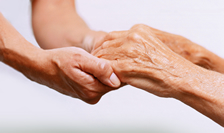Stroke Support Groups

 Stroke support groups help survivors and families cope with life after stroke. Support group members share experiences and encourage one another.
Stroke support groups help survivors and families cope with life after stroke. Support group members share experiences and encourage one another.
Why Are They Important?
Life after a stroke is often difficult. Talking to others who have been through stroke and recovery may help. Support groups focus on your strengths and successes. Some support groups invite guest speakers who are healthcare providers. Support groups are a good place to make friends.
They can help you and your loved one:
- Solve problems and get tips on caregiving
- Find local resources
- Get information on ways to improve health
- Learn about strokes and recovery
- Try new things, such as bowling or taking a dance class
What Do You Need to Know?
Stroke support groups are often run by hospitals, the VA or stroke-related volunteer groups. Many groups include members trained to answer your questions. There are different types of stroke support groups. Some groups include people with other medical conditions. To some, this makes the group more interesting. There are also support groups for caregivers only. Groups meet at days and times convenient for members.
How Do You Find a Stroke Support Group?
If you are looking for a stroke support group in your area, consider the following resources. Their contact information can be found in the Resources section.
- Talk with your local VA social worker. Other healthcare professionals such as nurses, psychologists and physical therapists can help.
- Search the National Stroke Association’s Stroke Group Registry.
- Call the American Stroke Association’s “Warmline.” It connects families with other stroke support groups.
- Check your local newspaper for announcements about stroke support groups.
How Do You Find Stroke Support Groups On-Line?
You may prefer an on-line support group. On-line support groups are often helpful if you lack time or can’t leave the house.
You can find on-line support groups through these Web sites:
- The Stroke Network
- The American Stroke Association
Helpful Tips
- You may have to visit several support groups to find the right one.
- Support groups do not take the place of medical care. Your healthcare provider knows what’s best for you and your loved one.
- You can even start a stroke support group. Find a helpful booklet from the National Stroke Association. The Resources section has a link to this booklet.
Remember
- It’s hard to adjust to the changes after stroke. Stroke support groups offer help and encouragement. They can help people get back into social activities.
- Different kinds of stroke support groups are available. Your loved one and you may go to a local group. You also may use an on-line group.
- Stroke support groups do not take the place of medical care.
More Resources 
Additional credible resources on this topic can be found here. Website pages may change or update, therefore if a link does not work, you may also try to type the information into your internet search bar. This Resource List will be updated frequently.
|
*Link Disclaimer: Links to information and Web sites outside of the Department of Veterans Affairs do not indicate an endorsement of products or services offered by the sites. In addition, these sites may have privacy and security policies that are inconsistent with those of VA. |
References: American Stroke Association. (2008). Successful Stroke Support Groups. Retrieved December 18, 2008, from: http://www.strokeassociation.org/presenter.jhtml?identifier=3030354*; American Heart Association. (2008). Stroke Support Groups. Retrieved December 19, 2008, from: http://my.americanheart.org/jiveforum/index.jspa*; National Stroke Association. (2008). Stroke Support Groups. Retrieved December 19, 2008, from: http://www.stroke.org/site/PageServer?pagename=support_groups*.
These materials were created for the project:
Web-Based Informational Materials for Caregivers of Veterans Post-Stroke
Project Number SDP 06-327 funded by VA HSR&D Quality Enhancement Research Initiative (QUERI)



















